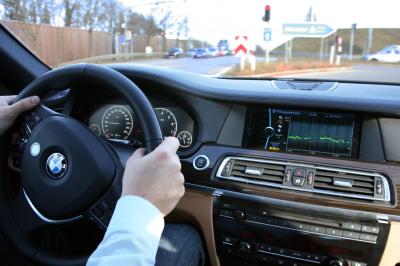Traffic safety is based on a number of parameters including the driver’s fitness. A team of researchers from the Technische Universitaet Muenchen (TUM), in partnership with BMW group researchers, have designed a sensor system incorporated in the vehicle’s steering wheel to check the health of the driver when on the move. A minor health check is possible while driving, at the same time it is possible to determine heart attacks or fainting spells.
 Scientists at the Technische Universitaet Muenchen have developed a sensor system integrated into the steering wheel that can monitor the driver's state of health while driving. Credit: Jakob Neuhäuser / Technische Universitaet Muenchen
Scientists at the Technische Universitaet Muenchen have developed a sensor system integrated into the steering wheel that can monitor the driver's state of health while driving. Credit: Jakob Neuhäuser / Technische Universitaet Muenchen
The system is capable of monitoring key parameters that include skin conductance, heart rate and oxygen saturation in the blood through sensors integrated in the steering wheel. The collected information is transmitted to a radiocontroller that can display the results obtained on the information system monitor of the vehicle. For example, the skin conductance of the driver shows the stress level of the driver and whether the blood pressure is in control. It is important that the hands of the driver be in contact with the sensors present in the steering wheel. The primary tests conducted using the systems showed good results.
According to Professor Tim C. Leuth, the lead researcher, when there is a stress situation, detected by the system using skin conductance values, it is possible to block phone calls or reduce the radio volume automatically. If the issue gets more serious, the hazard warning lights can be turned on, speed can be reduced and it is also possible to trigger automated emergency braking.
The system comprises mainly two sensors, one of which focuses infrared light on the fingers and determines the oxygen saturation and heart rate through the amount of light reflected. The other sensor determines the skin’s electric conductance when in contact.
To ensure that the results obtained are reliable, it is also possible to establish a radio connection with external devices such as a blood pressure monitor.